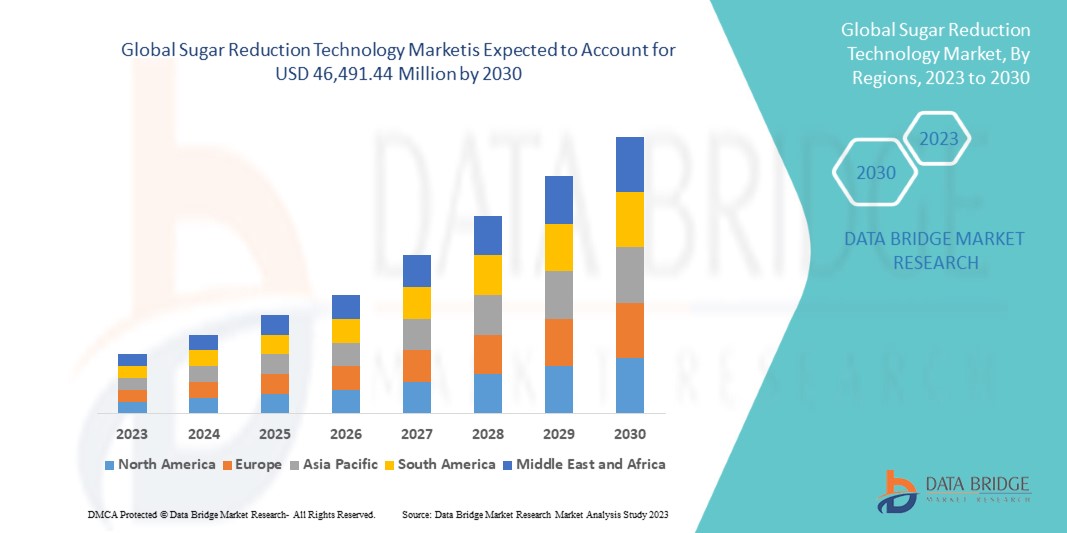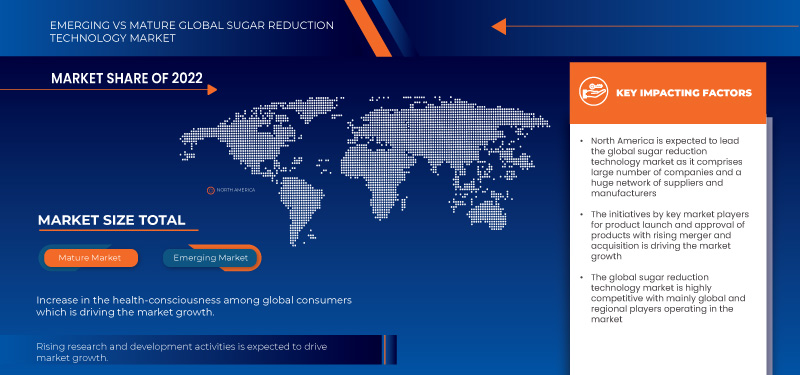Global Sugar Reduction Technology Market, By Alternative Type (Artificial Sweeteners, Naturally-Derived Sweeteners, Sugar Alcohols, and Sweetness Modulators), Technology (Enzymatic Conversion, Extraction Technology, Flavor Delivery Technology, Cambya Sugar Reduction Technology, and Others), Application (Food & Beverages, Bakery and Confectionery, Processed Foods, Dairy Products, and Others), Sales Channel (Direct Channel, Indirect Channel, and Specialty Stores), Form (Crystallized, Powder, Liquid, and Others) – Industry Trends and Forecast to 2030.

Sugar Reduction Technology Market Analysis and Insights
The increase in the health-consciousness among global consumers has enhanced the demand for the market. The growth in the demand for natural sweeteners as a safer alternative to artificial sweeteners also contributes to the market's growth. The major market players focus on various service launches and approvals during this crucial period. In addition, growth in the demand for natural sweeteners as a safer alternative to artificial sweeteners also contributes to the rising demand for sugar reduction technology.

The global sugar reduction technology market is expected to grow in the forecast year due to the rise in market players and consumers shifting preference toward low-sugar drinks. The consumers shifting preference toward low-sugar drinks is also expected to drive market growth. The increasing development of advanced techniques is further boosting market growth. However, government-imposed strict restrictions and regulations are expected to hamper the growth of the global sugar reduction technology market in the forecast period.
Data Bridge Market Research analyzes that the global sugar reduction technology market is expected to reach USD 46,491.44 million by 2030, at a CAGR of 10.2% during the forecast period.
|
Report Metric
|
Details
|
|
Forecast Period
|
2023 to 2030
|
|
Base Year
|
2022
|
|
Historic Years
|
2021 (Customizable to 2015-2020)
|
|
Quantitative Units
|
Revenue in USD Million
|
|
Segments Covered
|
Alternative Type (Artificial Sweeteners, Naturally-Derived Sweeteners, Sugar Alcohols, and Sweetness Modulators), Technology (Enzymatic Conversion, Extraction Technology, Flavor Delivery Technology, Cambya Sugar Reduction Technology, and Others), Application (Food & Beverages, Bakery and Confectionery, Processed Foods, Dairy Products, and Others), Sales Channel (Direct Channel, Indirect Channel, and Specialty Stores), Form (Crystallized, Powder, Liquid, and Others)
|
|
Countries Covered
|
U.S., Canada, Mexico, Germany, France, U.K., Italy, Spain, Russia, Turkey, Belgium, Denmark, Netherlands, Switzerland, Sweden, Poland, Norway, Finland, Rest of Europe, Japan, China, India, South Korea, Australia, New Zealand, Singapore, Thailand, Malaysia, Vietnam, Taiwan, Indonesia, Philippines, Rest of Asia-Pacific, Brazil, Argentina, Rest of South America, South Africa, Saudi Arabia, Bahrain, U.A.E., Kuwait, Oman, Qatar, Egypt, Israel, and Rest of Middle East and Africa
|
|
Market Players Covered
|
Valio Ltd., Kerry Group plc., Fooditive Group, Arboreal Stevia, Sweegen, BlueTree Technologies Ltd., Better Juice, Inulox Ltd , Layn Natural Ingredients, Bayn Solutions AB (publ), Sensient Technologies Corporation, Givaudan, ADM, Cargill, Incorporated, Tate & Lyle , Ingredion Incorporated, AJINOMOTO FOODS EUROPE SAS, Roquette Freres, Celanese Corporation, Firmenich SA, and DouxMatok among others
|
Global Sugar Reduction Technology Market Definition
The sugar reduction technology market refers to the industry and market segment focused on developing and implementing technologies that reduce the amount of sugar in various food and beverage products. These technologies aim to provide alternative solutions to traditional sugar-based ingredients while maintaining taste, texture, and other sensory attributes. Sugar reduction technologies encompass a wide range of approaches, including but not limited to natural sweeteners.
These technologies and products are widely used in food and beverage industry to develop healthier products. These technologies include the use of natural and artificial sweeteners, sugar substitutes, and flavor enhancers. They are used to reduce the sugar content in various products such as soft drinks, juices, cereals, baked goods, confectionery, and dairy products.
Global Sugar Reduction Technology Market Dynamics
This section deals with understanding the market drivers, advantages, opportunities, restraints, and challenges. All of this is discussed in detail below:
Drivers
- Increase in the Health-Consciousness Among Global Consumers
Sugar is a product used for sweetening. It comes from seaweeds, cereals, fruits, milk, and sugarcane. The demand for mannose, ramose, and xylose has dramatically increased due to the increased health consciousness among people and the benefits they provide. The most popular and essential components in the worldwide food and beverage business are plant-derived and synthetic sugars, which alter the taste and improve the palatability of finished goods. Because some carbohydrates, such as glucose and fructose, instantly give the body more energy, demand for these sugars has substantially increased.
Opportunity
-
Rise in the Demand for Healthy Food Ingredients in the Food and Beverage Sector
The increasing trend of a healthy lifestyle drives the market growth, while natural sweetener products further help accelerate this growth. The customer base which hesitated to adopt artificial sweeteners due to ambiguity regarding the product is getting convinced regarding natural sweeteners. The benefits of natural sugar substitute sweeteners, such as improved taste, healthier, and environmental friendliness, drive the market growth by attracting the customer's attention.
Consumers are getting more concerned about the food content due to increased awareness about health benefits and negative sugar effects. Sugar-reduced products are being produced by the food industry with alternate substitutes in the food, bakery, beverage products, and others. Increased adoption or use of reduced sugar in food products is helping market players for marketing purposes by labeling them as low calories food products.
Challenges/ Restraints
- Government- Imposed Strict Restrictions and Regulations
Consumers' growing inclination towards healthy food and health-conscious nature has significantly increased the use of products with no added sugar and sweetener labels. The government set up certain rules and actions to reduce sugar intake through selective taxation, reformulations, and packaging labels. The government has been continuously monitoring the situation in the sugar sector, including sugar production, consumption, export, and price trends in wholesale and retail markets all over the country.
Though food and drug administration (FDA) approved products are considered safe, there are questionable health downsides associated with artificial and non-nutritive sweeteners. In the case of natural sweeteners, overconsumption can lead to health problems such as tooth decay and poor nutrition.
- Side Effects of Reducing Sugar Intake
Common sugar withdrawal symptoms include cravings and fatigue, but sometimes, people experience irritability, depressed mood, and other unwanted symptoms. Sugar withdrawal can feel severe and unpleasant for people on low-sugar diets, such as the ketogenic diet. Manufacturers are producing and promoting reduced sugar, zero calories, and clean-label products in the beverage sector as customers become more concerned with issues regarding sugar replacements.
Recent Developments
- In February 2023, Kerry Group plc, a world leader in taste and nutrition, and c-LEcta, a leading biotechnology company in enzyme engineering and bioprocess development, jointly announced a new partnership to market DENARASE products. This has helped the company to expand its product portfolio.
- In January 2022, Valio Ltd will buy the Gold&Green brand, intellectual property, and R&D function from Paulig. Paulig, the international, family-owned food and beverage company, plans has agreed to sell its Gold&Green brand, intellectual property, and R&D function to Valio. This has helped the company to expand its research and development activities.
Global Sugar Reduction Technology Market Scope
Global sugar reduction technology market is segmented into six notable segments such as alternative type, technology, application, sales channel and form The growth among segments helps you analyze niche pockets of growth and strategies to approach the market and determine your core application areas and the difference in your target markets.
Alternative Type
- Artificial Sweeteners
- Naturally-Derived Sweeteners
- Sugar Alcohols
- Sweetness Modulators
On the basis of alternative type, the global sugar reduction technology market is segmented into artificial sweeteners, naturally-derived sweeteners, sugar alcohols, and sweetness modulators.
Technology
- Enzymatic Conversion
- Extraction Technology
- Flavor Delivery Technology
- Cambya Sugar Reduction Technology
- Others
On the basis of technology, the global sugar reduction technology market is segmented into enzymatic conversion, extraction technology, flavor delivery technology, cambya sugar reduction technology, and others.
Application
- Food & Beverage
- Bakery and Confectionery
- Dairy Products
- Processed Foods
- Others
On the basis of application, the global sugar reduction technology market is segmented food & beverages, bakery and confectionery, processed foods, dairy products, and others.
Sales Channel
- Direct Channel
- Indirect Channel
- Specialty Stores
On the basis of sales channel, the global sugar reduction technology market is segmented direct channel, indirect channel, and specialty stores.
Form
- Crystallized
- Liquid
- Powder
- Others
On the basis of form, the global sugar reduction technology market is segmented into crystallized, powder, liquid, and others.
Global Sugar Reduction Technology Market Regional Analysis/Insights
The global sugar reduction technology market is categorized into five notable segments: alternative type, technology, application, sales channel and form.
The countries covered in this market report are U.S., Canada, Mexico, Germany, France, U.K., Italy, Spain, Russia, Turkey, Belgium, Denmark, Netherlands, Switzerland, Sweden, Poland, Norway, Finland, Rest of Europe, Japan, China, India, South Korea, Australia, New Zealand, Singapore, Thailand, Malaysia, Vietnam, Taiwan, Indonesia, Philippines, Rest of Asia-Pacific, Brazil, Argentina, Rest of South America, South Africa, Saudi Arabia, Bahrain, U.A.E., Kuwait, Oman, Qatar, Egypt, Israel, and Rest of Middle East and Africa.
North America is expected to dominate due to the presence of key market players in the largest consumer market with high GDP. U.S. is expected to grow due to rise in technological advancement in sugar reduction technology market. It is dominating the sugar reduction technology market due to the increasing investment in various technologies and is expected to boost the market growth. The U.S. dominates North America region due to strong presence of key players. Germany dominates Europe region due to the increasing demand from emerging markets and expansion. Japan dominates Asia-Pacific region due to increasing customer inclinations towards advanced technological processes.
The country section of the report also provides individual market impacting factors and changes in regulation in the market domestically that impact the current and future trends of the market. Data points such as new sales, replacement sales, country demographics, regulatory acts, and import-export tariffs are some of the major pointers used to forecast the market scenario for individual countries. Also, presence and availability of global brands and their challenges faced due to large or scarce competition from local and domestic brands, and impact of sales channels are considered while providing forecast analysis of the country data.
Competitive Landscape and Global Sugar Reduction Technology Market Share Analysis
Global Sugar Reduction Technology Market competitive landscape provides details by competitor. Details included are company overview, company financials, revenue generated, market potential, investment in R&D, new market initiatives, production sites and facilities, company strengths and weaknesses, product launch, product approvals, product width and breath, application dominance, product type lifeline curve. The above data points provided are only related to the company's focus on the Global Sugar Reduction Technology Market.
Some of the major market players operating in Reduction Technology Market are Valio Ltd., Kerry Group plc., Fooditive Group, Arboreal Stevia, Sweegen, BlueTree Technologies Ltd., Better Juice, Inulox Ltd, Layn Natural Ingredients, Bayn Solutions AB (publ), Sensient Technologies Corporation, Givaudan, ADM, Cargill, Incorporated, Tate & Lyle, Ingredion Incorporated, AJINOMOTO FOODS EUROPE SAS, Roquette Freres, Celanese Corporation, Firmenich SA, and DouxMatok among others.
SKU-

